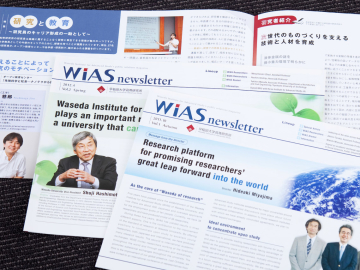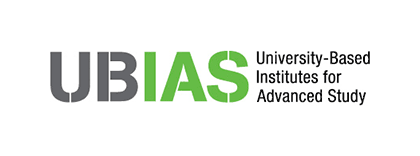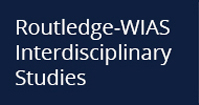Researchers
In 2016, we welcomed twelve new members into the Institute. Each of them briefly introduces his/her research fields.
|
OHTSUKI, Kazuto |
|
I study the (long-term) processes in which governance and conflict affect each other, using game theory, observational study, and experiment. Specifically, my research examines the mechanisms by which war determines institutional change and the levels of “suffering” and recovery of post-conflict societies, which advances the scientific literature that has paid almost exclusive attention to the causes of war as a rather isolated single event. |
|
|
KAWANA, Yuichiro |
|
The question of ‘what is human character’ has been one of the most perplexing ones throughout the history of human speculation; nineteenth century Europe witnessed several attempts to form a ‘science of character’ whose subject-matter was the nature and formation of character. My research will discuss these intellectual attempts, and the European society where these were incubated. |
|
|
SHEN, Menghan |
|
I conduct applied microeconomics research in education, health, and political economy. My expertise is to identify causal relationship using quasi-experiment and randomized control trials. Currently, I am interested in understanding how to reduce black-white achievement gaps in the United States, how to improve the education outcomes in China, and the social and economic return to political connection in China. |
|
|
SUGIME, Hisashi |
|
Owing to their size, outstanding electrical properties, and biocompatibility, carbon nanotube (CNT) holds potential applications in many technologies. We need to control the morphology of assembled CNTs to utilize their properties effectively. I am focusing on the CNT forests which have high areal density of CNTs on substrates. Especially, I am focusing on the controlled growth of patterned CNT forests on conductive underlayers, and the mechanism of growth termination of the forests. |
|
|
SOMA, Takuya |
|
The main scope of my study is adaptability and survivability of human being under/towards the extreme condition by theory and method based on ecological anthropology/ human ecology. This study tries to fieldwork-based scientific explication about centuries-lasting ideas of survivability, TEK for disaster reduction, and environmental symbiotic interaction fostered among nomadic animal herders (especially Mongolians and Kazakhs) living in Mongolia, Altai Mountain, and Central Asia, so called “the Eurasian steppe territory”. |
|
|
ZUFALL, Frederike |
|
The purpose of my research is to clarify the conditions as well as the limits of sovereignty and international jurisdiction with respect to conflicting national Internet regulation. More specifically, it examines connecting criteria or genuine links used by national Internet regulation regimes to establish international jurisdiction. |
|
|
NISHIOKA, Yuichiro |
|
My research interests are the paleontology of mammals. I specialize in small mammals primarily from the Neogene and Quaternary of Japan and Southeast Asia to understand their faunal turnover and morphological change. Work here is focusing on the Quaternary mammalian fossils (Nobuo Naora’s collection in the Waseda University), which can reveal the relationship between species extinction and past environments during the glacial period of Japan. |
|
|
BABA, Masahiro |
|
My research seeks to understand the process of social complexity during the formative stages of the ancient Egyptian civilization. Ongoing excavations at the Predynastic site of Hierakonpolis provide extensive evidence of the social inequality and specialized production activities. Based on the archaeological evidence, an integrated research is carried out in collaboration with physical anthropology, faunal and botanical archaeology. |
|
|
FUJIE, Toshinori |
|
This study envisages the development of soft electronics for body digitization by integrating printed electronics and polymer nanosheet technology. The information management from external body will be utilized not only for electronic health records but also for triage tags in a disaster situation or implantable biodevices for diagnosis and therapeutics. Towards the regenerative medicine society, implantable electronics will realize the health management of patients in transplantation, home therapy and rehabilitation, consistently. |
|
|
FUJIWARA, Makoto |
|
I am currently interested in foundation of constructive mathematics. Constructive mathematics has its roots in Brouwer’s intuitionistic mathematics, but Bishop-style constructive mathematics, which is consistent with classical mathematics, is most common in this age. I would like to give some mathematical foundation to modern constructive mathematics according to intuitionistic logic, which is introduced originally for the formalization of intuitionistic mathematics, together with weak logical principles. |
|
|
MORI, Shin’nosuke |
|
My major is the intellectual history of early medieval Japan, with a recent focus on sinology. Since this period has been presented as an age of Buddhism, sinological issues and approaches to the period have generally been neglected. I will try to reveal some issues, such as “what sinology in this period was,” “what the meaning of this was,” and “why it came to be underappreciated” |
|
|
WATANABE, Hiroshi |
|
I have studied interesting phenomena in solids induced by Coulomb interactions of electrons and hydrogen dynamics. My aim is to clarify the mechanism of superconductivity, magnetism, and metal-insulator transition and to predict novel and useful phenomena in strongly correlated electron system. I also promote the multiple field study by introducing the knowledge of physics into the research of molecular crystals which has mainly progressed in the field of chemistry. |
|
Activity
UBIAS Intercontinental Academia Participation Report (March 7, 2016 – March 18, 2016)
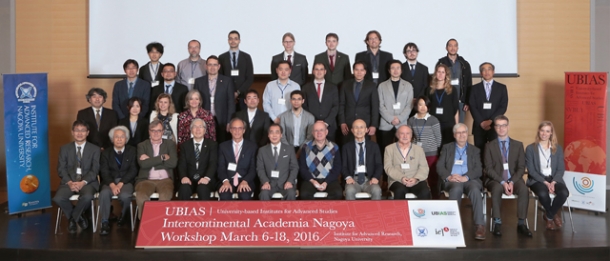 |
This Workshop was a continuation to the UBIAS Intercontinental Academia held at the University of Sao Paulo in Brazil in April 2015.
Continuing on the theme of “TIME,” academic lectures and discussions were held over a period of about two weeks from the perspectives of various academic disciplines. The greatest characteristic of the Nagoya Workshop was, as one might expect, the lectures conducted on the first day by researchers who have received the Nobel Prize. The participants greatly looked forward to the lectures as they offered the opportunity to hear directly from world-renowned researchers such as Toshihide Masukawa and Ryoji Noyori. Professor Masukawa, who specializes in theoretical physics, left a particularly deep impression with his emphasis on the importance of studying philosophy. Concurrently with the academic lectures on “TIME,” the Nagoya Workshop also covered a separate type of lecture on fundamental policies for promoting academic research. This lecture covered topics such as the significance and outlook for advanced research or advanced research institutions, and why interdisciplinary research is drawing attention today and whether it is necessary. This session was an opportunity for all participants to engage in comprehensive discussion in order to share their views on these topics. Upon the conclusion ofthe event held at Waseda University on March 14, in the midst of the Workshop period, and after the return to Nagoya, the focus was turned to the development of a MOOC, (※1) which was the final goal of the workshops in Sao Paulo and Nagoya. |
| Many discussions on the contents of the MOOC were held, and efforts were committed to the writing of the script. The results were announced at a final presentation session held on the morning of March 18. In addition, the Nagoya Workshop also offered a rich line-up of experiential programs and activities introducing Japanese culture and history. These included a rare tasting of various types of Japanese cuisine, Zen meditation and tea ceremony experiences, and visits to museums with exhibits on Toyota or items related to the Tokugawa family. For participants from overseas, this was a unique opportunity for learning about Japan. |
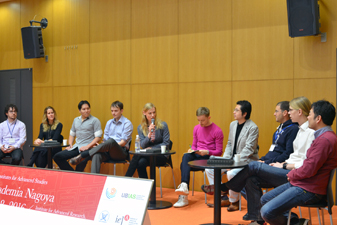 |
| As in Sao Paulo, scenes from this Nagoya Workshop were uploaded onto the Internet in the form of videos and photographs, and is available for everyone to view freely online.(※2) |
Kazuhisa Takeda, Assistant Professor, WIAS (As of March 2016)
Currently, Senior Assistant Professor, School of Political Science and Economics, Meiji University |
※1 The abbreviation for Massive Open Online Course, a form of online teaching material provided by various providers. Coursera is one of the providers that was launched in April 2012 by researchers specializing in computer science at Stanford University.
※2 http://intercontinental-academia.ubias.net/nagoya |
Information
WIAS invites distinguished, internationally active researchers from overseas. Through scholarly exchanges, seminars, and other activities jointly undertaken with Waseda researchers, WIAS contributes to the invigoration of the university’s research activities.
> more information |
|
|
June 6, 2016 – July 6, 2016 |
|
MURPHY-SHIGEMATSU, Stephen: Stephen: Professor, Stanford University (USA) |
|
|
|
|
|
June 15, 2016 – July 15, 2016 |
|
GROVER FRIEDLANDER, Michal: Associate Professor, Tel Aviv University (Israel) |
|
|
|
|
|
November 1, 2016 – November 30, 2016 |
|
STAROBINSKY, Alexei A.: Principal Researcher, Russian Academy of Sciences (Russia) |
|
|
Waseda Institute for Advanced Study (WIAS)
1-6-1 Nishi Waseda, Shinjuku-ku, Tokyo 169-8050, JAPAN
URL:www.waseda.jp/inst/wias/
TEL:03-5286-2460
FAX:03-5286-2470
E-mail:[email protected]




![]()
![]()

